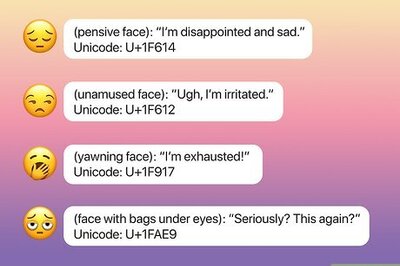
views
New Delhi: The hearings in Kulbhushan Jadhav case at the International Court of Justice concluded on Thursday as Pakistan delivered a final salvo and accused India of maintaining “double standards” and said the accusations against it lacked any evidence.
India on February 20 had questioned the functioning of Pakistan's notorious military courts and urged the ICJ to annul Jadhav's death sentence, which it said was based on an "extracted confession".
Jadhav, 48, a retired Indian Navy officer, was sentenced to death by a Pakistani military court on charges of "espionage and terrorism" after a closed trial in April 2017. His sentencing evoked a sharp reaction in India.
"Annul the decision of the military court and restrain Pakistan from giving effect to the (death) sentence. Release Jadhav and ensure his safe passage to India. If not then direct a trial under normal law before civilian courts with full consular access," Deepak Mittal, Joint Secretary, the Ministry of External Affairs, told the ICJ judges.
Queen’s Counsel, Khawar Qureshi, while making his rebuttals on Thursday, stated that India was not responding substantively but had based the arguments only on “rhetoric”.
“India has made no arguments substantive or otherwise. The double standard India has engaged in is evident from its submissions itself. India is seeking to distance itself from the position stated by this court itself,” submitted Qureshi.
Salve had said that Pakistan is used as a safe haven by UN proscribed terrorist entities like al-Qaeda, LeT, JeM, Haqqani Network and individuals like Hafiz Saeed and underworld don Dawood Ibrahim.
He also cited Pakistan's former PM Nawaz Sharif's interview to a newspaper in which he acknowledged his country's role in the 2008 Mumbai attack in which 166 people were killed by 10 LeT terrorists.
However, Qureshi stated that “characters from wonderland have no place in this Court”, and that “Pakistan will adopt a real approach to language”.
Pakistan’s counsel also stated that there were no inaccuracies in his pleadings on fact.
"I challenge India to find any discrepancy in my pleadings on fact", Khawar Qureshi said.
On Pakistan's military courts, Salve had said that the International Commission of Jurists and European Parliament have criticised their functioning and added that anything diluting provisions of Vienna Convention must fail.
But Qureshi retorted by arguing that “India's conduct cannot go unchecked” as “this was the court of international community, not fantasy not fiction”.
Qureshi argued that Peshwar High Court had an effective review and reconsideration mechanism and that the same has been concluded by independent experts.
He sought to prove that “India’s response to the decision of Peshawar High Court is irrelevant because it is the subject of appeal.”
“That stance is incorrect,” said Khawar Qureshi.
“I have been forced to use forceful language in the face of the brazen distortion of 2008 agreement and doctoring of military experts report by India”, argued the lawyer.
Pakistan also raised question on how India awards death sentence to its convicts and raised fingers at its judicial basis.
“Citing Afzal Guru's case, it stated that the Supreme Court of India upheld his death sentence on the ground of satisfying ‘collective conscience of the society’. Is that a ground for hanging,” questioned Qureshi.
Qureshi also cited Gujarat riots, Samjhauta express blast case, Kathua rape and use of pellet guns to show how the criminal justice system functions in India in its concluding submissions.
Harish Salve, who was representing India in the case, also said that the time has come for the ICJ to make Article 36 a potent weapon for protecting human rights.
Salve had said Pakistan has continued to misuse the opportunity provided by the ICJ in the Jadhav case. After this closing round of arguments by Pakistan, the court has now retired for deliberations and will now soon inform the parties a date when the judgment will be delivered in the case.




















Comments
0 comment